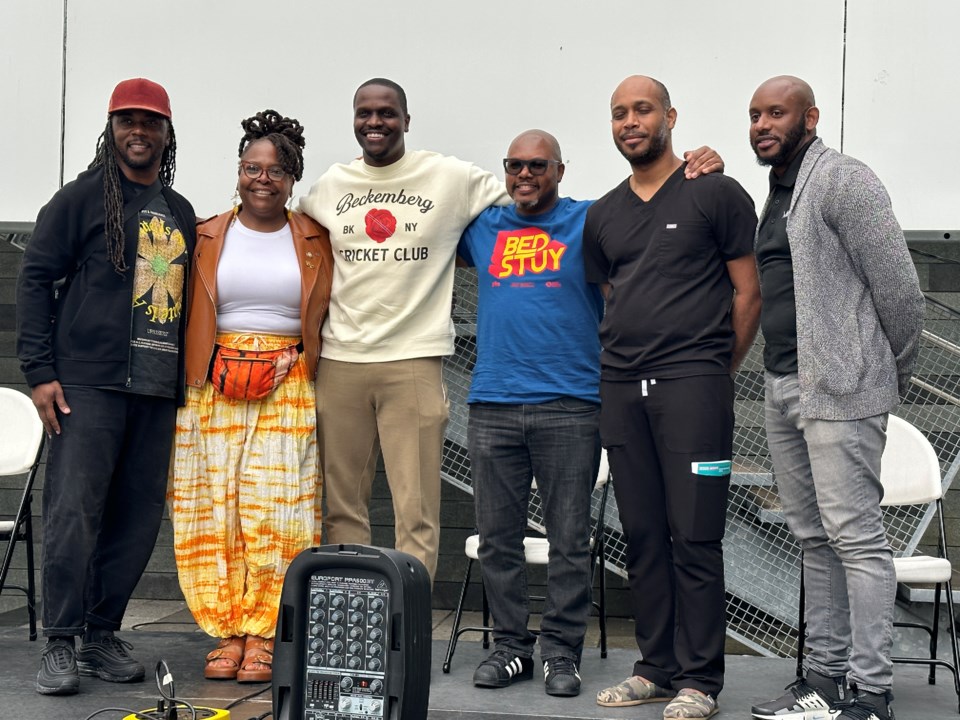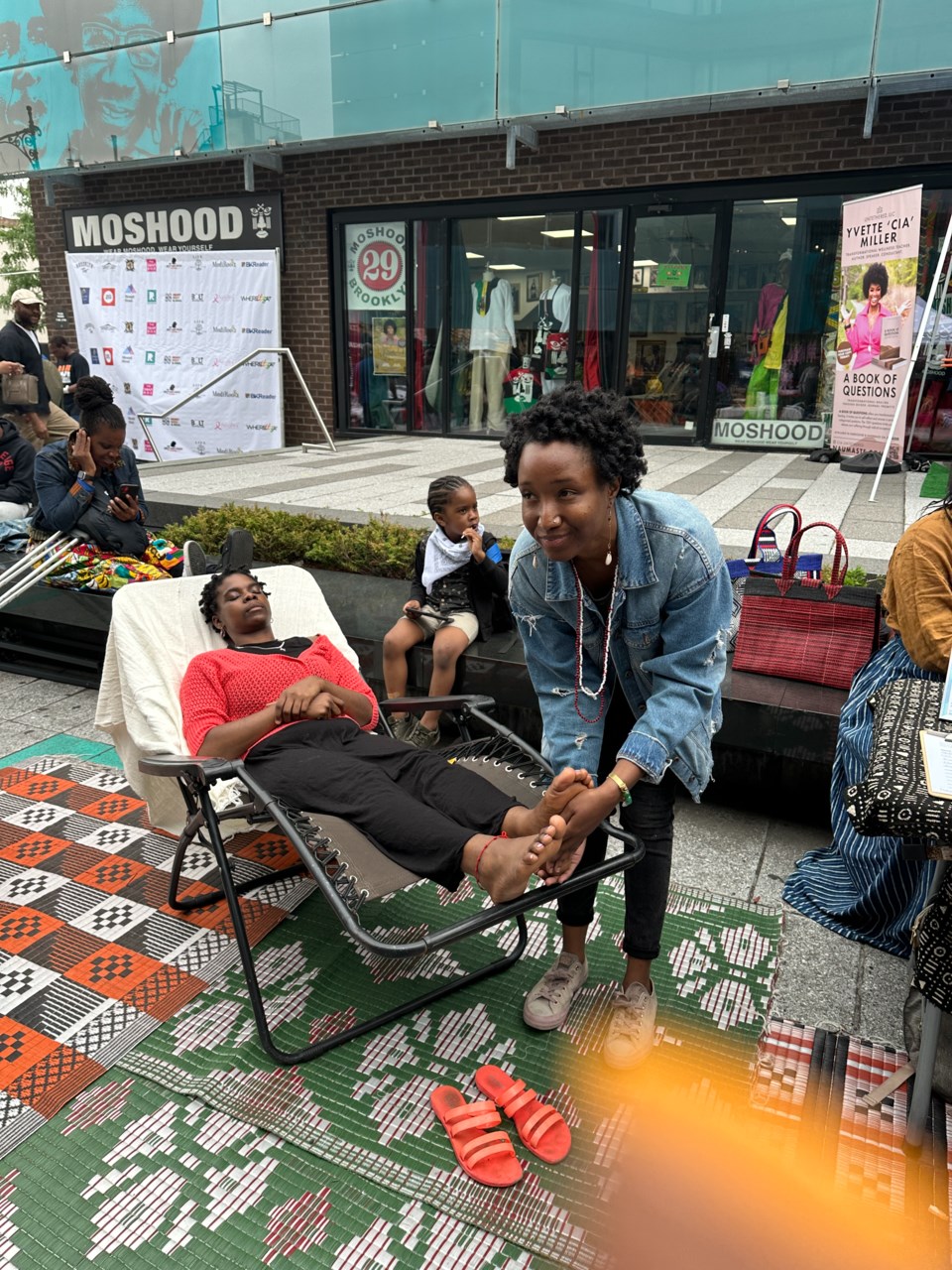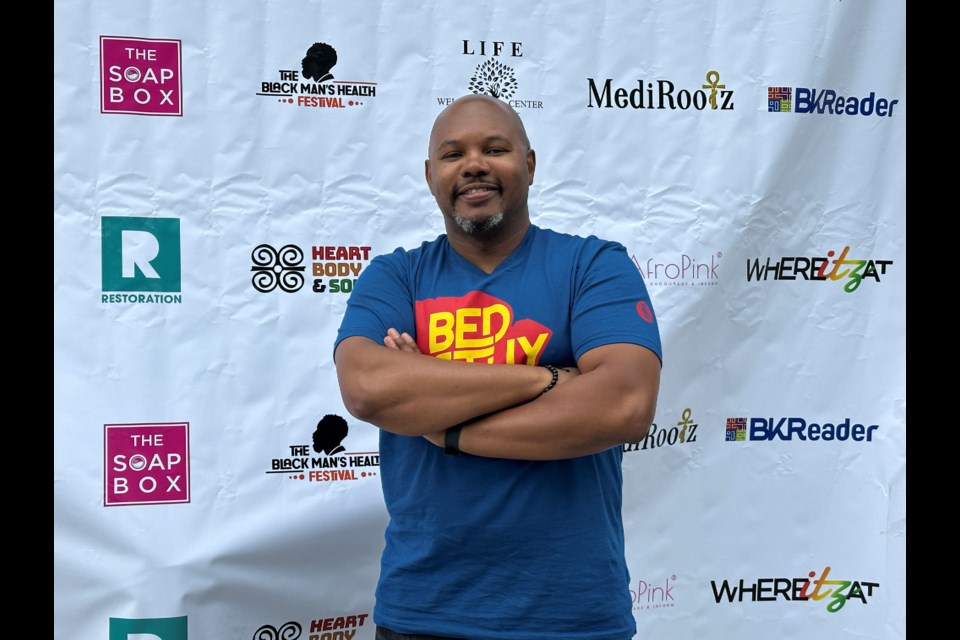Bed-Stuy resident Christopher Williams was raised by loving Jamaican parents, in a pescatarian household, where healthy eating and physical fitness were a lifestyle.
Williams was a natural writer and loved to project manage. And so his father started a montly publication, WhereitzAt, a magazine that offered community updates on the Caribbean-American community in New York City. And he was preparing his son early to take over the reins.
By his 30s, Williams began working as a project manager for the state of New York, while also learning how to run the family’s magazine. The future was looking pretty darn bright for Williams, except for one thing: He was a Black man in America.
Socioeconomic factors, including lower income levels, higher levels of stress and limited access to healthcare services contribute to the increased risk and poorer health outcomes for Black men in the United States.
That meant that, statistically, there was a greater chance than the rest of the population Christopher Williams would suffer a health condition or have a heart attack before the age of 45. In fact, the incidence of heart attacks in Black men tends to be highest in the age range of 35 to 44, according to the Centers for Disease Control and Prevention.
And true to form, at age 42, Williams suffered a heart attack. In early 2021, at age 48, he was diagnosed with Appendiceal cancer, and later that same year, he suffered another heart attack.
“So health has never been something I took for granted,” said Williams. “I had to work on not internalizing things, doing a better job at managing my stress.
“I just did not prioritize well enough to maintain good health.”
Williams survived both heart attacks and his harrowing bout with cancer. But now, he’s on a mission to help as many Black men as possible understand that achieving financial success, or fighting racism or taking care of your family … none of that is possible if you’re sick, dying or, worse, dead.
“We can’t fight this institution of racism– or anything, for that matter– if we’re unhealthy,” Williams said. “We need our mental and physical strength. Health needs to become our number-one priority as Black men to ensure that we can do the things we need to do to secure the future for ourselves and our loved ones.”
Williams said his cancer originally was misdiagnosed and that there were many times he felt the health professionals at the hospitals and clinics in his community were not taking his concerns seriously. He spoke to a few other male friends and learned they were having similar struggles in the healthcare system.
“I couldn’t understand why, in this century, we still do not have the tools or resources to get quality care in our own communities. Why do we still have to drive outside of our neighborhoods to get quality care and be seen by quality doctors? And we still have to have great insurance– which means a certain type of job and income– to access quality of care. I was frustrated that people were dying from things that were preventable. I was frustrated that I almost became another death statistic. And I wanted to do something that gave us more control in our own health outcomes.”
So, that same year, in 2021, Williams founded Heart, Body and Soul, a non-profit outreach organization focused specifically on Black men’s health.
And on Saturday, June 3, Heart Body and Soul hosted a community health event in Bed-Stuy called the Black Man's Health Festival that brought together the city’s top Black health practitioners– from medical doctors, to massage therapists, to acupuncturists, to herbalists, to chefs– for panels and demonstrations on Black men’s health.
The Black Man's Health Festival, which was also sponsored in partnership with MediRootz, AfroPink, Life Wellness Center, Bolt Architecture, the office of Assemblywoman Stefani Zinerman, WhereItzAt Magazine, Bedford Stuyvesant Restoration Corporation, Complete Health Ventures, Mount Sinai, Good People NYC, The Jumaane Omar Stewart Foundation, The Soap Box, Hip Hop Closet, Brooklyn Tea, and BK Reader, took place during the block party outside of Restoration Plaza.

Mount Sinai Hospital was on-site conducting free PSA blood tests to screen for prostate cancer. New York Presbyterian Hospital was sharing information on lung cancer awareness and heart health. There were free body massages sponsored by Life Wellness Center; Chef A Renee held a healthy cooking demonstration; and there was a panel discussion led by Williams with Dr. Maurice Hinson, founder of MediRootz, Dr. Kwesi Blackman vice president of Complete Health Ventures, Dr. Matthew Jones, founder of BKLYN Cardio, and Jamil Smith, DACM of, Life Wellness Center.

“Black men are walking around with severe depression, severe anxiety, PTSD,” said Dr. Hinson on the panel Saturday. “As men, we’re raised not to express ourselves emotionally, and this becomes an incredibly dense stress burden, and stress is one of the drivers of chronic disease– it manifests as high blood pressure; as diabetes, as heart disease. And really it all came from not managing the mental aspect first. We can’t heal the body without healing the mind first.”
Williams agrees and said stress played a big role in his health challenges: “I internalize a lot. I don’t talk about the things that are bothering me, so I would just go it alone. Because, ‘Hey, I’ve got to be tough, I’ve got to be the man.’
“We hear all the time from our community, ‘Man up!’ We hear from our parents, “What are you crying for? Stop crying like a baby! Just do it! Get it done!’ These statements lead us to where we as Black men, we don’t show emotion and don’t communicate which leads to all of these missteps throughout life where we’re often in pain and don’t show it; or feeling a serious amount of stress and don’t say anything until it’s too late.”
“It’s time to de-hypnotize ourselves. Because it’s a form of hypnosis, believing this is the way we are supposed to think, and this is how we’re supposed to live.”




